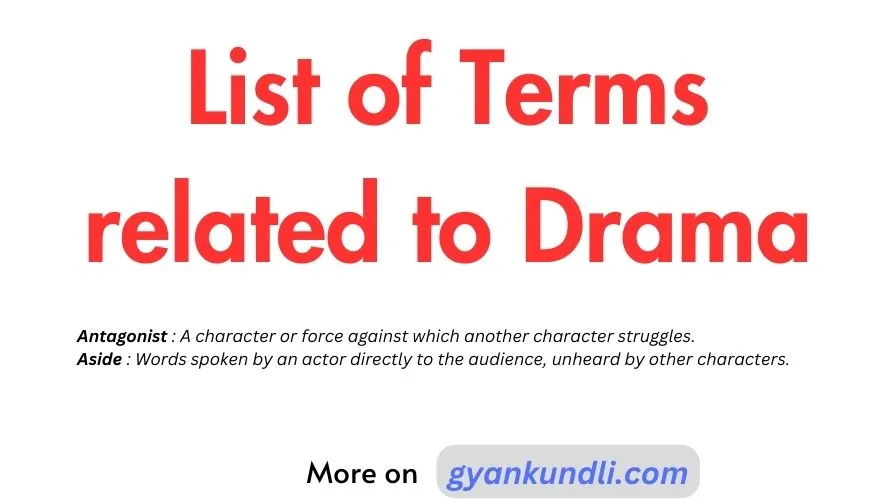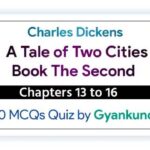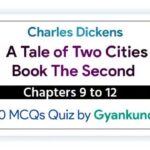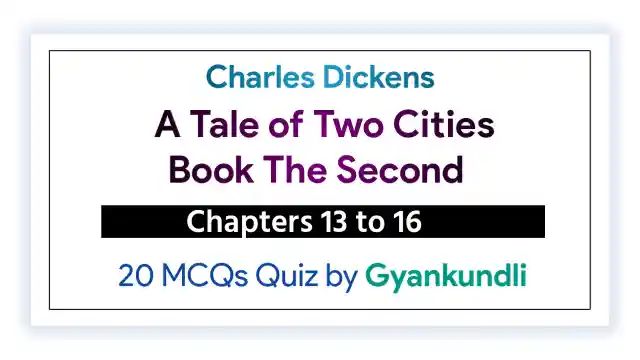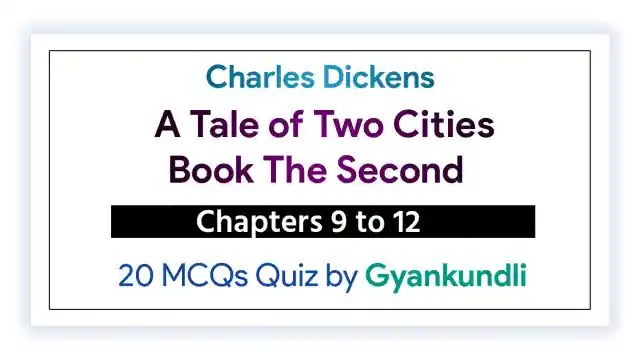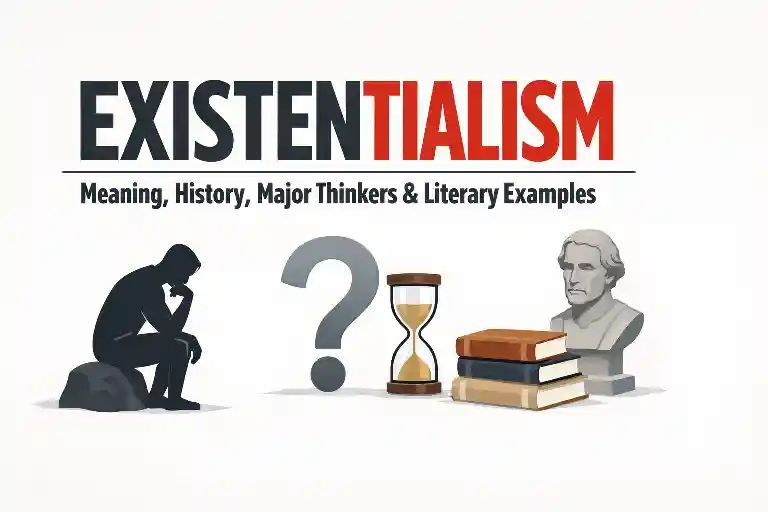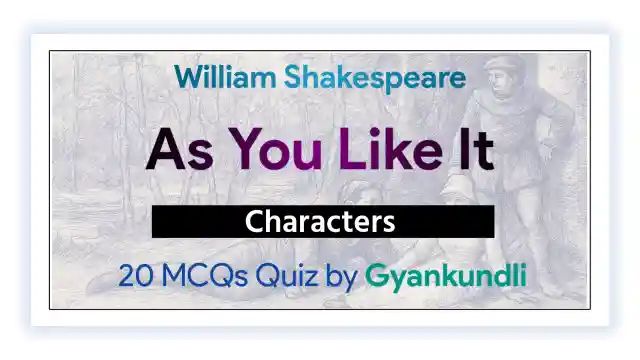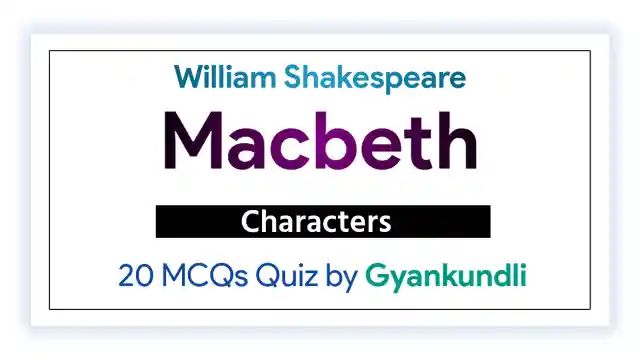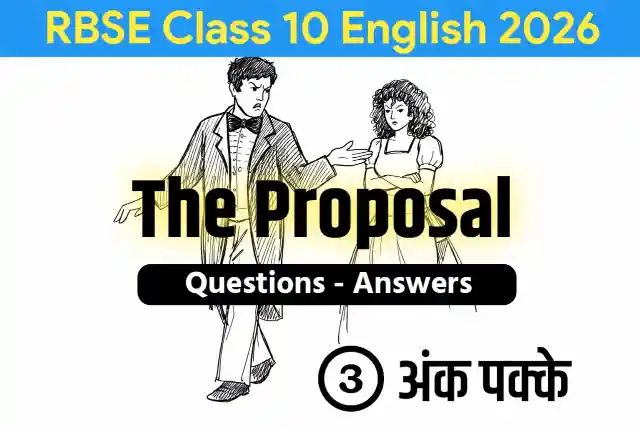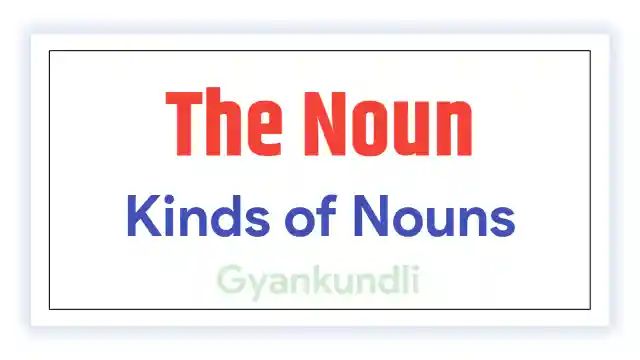Glossary of Drama Terms [List of Terms Related to Drama]
| Term | Definition |
|---|---|
| Allegory | A symbolic narrative where surface details imply a secondary meaning. |
| Alliteration | The repetition of consonant sounds, especially at the beginning of words. |
| Antagonist | A character or force against which another character struggles. |
| Aside | Words spoken by an actor directly to the audience, unheard by other characters. |
| Assonance | The repetition of similar vowel sounds in a sentence or line of poetry or prose. |
| Catastrophe | The action at the end of a tragedy that initiates the falling action. |
| Catharsis | The purging of feelings of pity and fear in the audience, according to Aristotle. |
| Character | An imaginary person in a literary work, major or minor, static or dynamic. |
| Characterization | The means by which writers present and reveal character. |
| Chorus | A group of characters in Greek tragedy commenting on the action without participating. |
| Climax | The turning point of the action in the plot of a play or story. |
| Comedy | A type of drama in which characters experience reversals of fortune, usually for the better. |
| Comic Relief | The use of a comic scene to interrupt a succession of intensely tragic dramatic moments. |
| Complication | An intensification of the conflict in a story or play. |
| Conflict | A struggle between opposing forces in a story or play. |
| Connotation | The associations called up by a word that go beyond its dictionary meaning. |
| Convention | A customary feature of a literary work. |
| Denotation | The dictionary meaning of a word. |
| Denouement | The resolution of the plot of a literary work. |
| Deus ex machina | A god who resolves the entanglements of a play by supernatural intervention. |
| Dialogue | The conversation of characters in a literary work. |
| Diction | The selection of words in a literary work. |
| Dramatic Monologue | A type of poem in which a speaker addresses a silent listener. |
| Dramatis Personae | Characters or persons in a play. |
| Exposition | The first stage of a fictional or dramatic plot, providing necessary background information. |
| Fable | A brief story with an explicit moral provided by the author. |
| Falling Action | In the plot of a story or play, the action following the climax. |
| Fiction | An imagined story in prose, poetry, or drama. |
| Figurative Language | A form of language use in which writers and speakers convey something other than the literal meaning of their words. |
| Flashback | An interruption of a work’s chronology to describe or present an incident that occurred prior to the main time frame of a work’s action. |
| Foil | A character who contrasts and parallels the main character in a play or story. |
| Foot | A metrical unit composed of stressed and unstressed syllables. |
| Foreshadowing | Hints of what is to come in the action of a play or a story. |
| Fourth Wall | The imaginary wall of the box theater setting, supposedly removed to allow the audience to see the action. |
| Gesture | The physical movement of a character during a play. |
| Hyperbole | A figure of speech involving exaggeration. |
| Iamb | An unstressed syllable followed by a stressed one. |
| Image | A concrete representation of a sense impression, a feeling, or an idea. |
| Imagery | The pattern of related comparative aspects of language, particularly of images, in a literary work. |
| Irony | A contrast or discrepancy between what is said and what is meant or between what happens and what is expected to happen in life and in literature. |
| Literal Language | A form of language in which writers and speakers mean exactly what their words denote. |
| Metaphor | A comparison between essentially unlike things without an explicitly comparative word such as like or as. |
| Meter | The measured pattern of rhythmic accents in poems. |
| Metonymy | A figure of speech in which a closely related term is substituted for an object or idea. |
| Monologue | A speech by a single character without another character’s response. |
| Narrator | The voice and implied speaker of a fictional work. |
| Onomatopoeia | The use of words to imitate the sounds they describe. |
| Parody | A humorous, mocking imitation of a literary work. |
| Pathos | A quality of a play’s action that stimulates the audience to feel pity for a character. |
| Personification | The endowment of inanimate objects or abstract concepts with animate or living qualities. |
| Plot | The unified structure of incidents in a literary work. |
| Point of View | The angle of vision from which a story is narrated. |
| Props | Articles or objects that appear on stage during a play. |
| Protagonist | The main character of a literary work. |
| Quatrain | A four-line stanza in a poem. |
| Recognition | The point at which a character understands their situation as it really is. |
| Resolution | The sorting out or unraveling of a plot at the end of a play, novel, or story. |
| Reversal | The point at which the action of the plot turns unexpectedly for the protagonist. |
| Rising Action | A set of conflicts and crises leading up to the climax in a play or story. |
| Satire | A literary work that criticizes human misconduct and ridicules vices, stupidities, and follies. |
| Setting | The time and place of a literary work. |
| Simile | A figure of speech involving a comparison using “like,” “as,” or “as though.” |
| Soliloquy | A speech meant to be heard by the audience but not by other characters. |
| Stage Direction | Descriptive comments by a playwright providing information about a play’s dialogue, setting, and action. |
| Staging | The presentation of a play in performance, including actors’ positions, scenery, props, costumes, and lighting. |
| Stanza | A division or unit of a poem, repeated in the same form. |
| Style | The way an author chooses words, arranges sentences, and develops ideas using literary techniques. |
| Subject | What a story or play is about, distinct from plot and theme. |
| Subplot | A subordinate or parallel plot coexisting with the main plot in a play or story. |
| Symbol | An object or action in a literary work representing something beyond itself. |
| Synecdoche | A figure of speech where a part is substituted for |
Our Previous Post : Of Studies by Francis Bacon: Introduction, Summary & Analysis
Discover more from Gyankundli
Subscribe to get the latest posts sent to your email.
